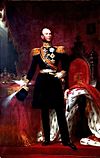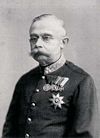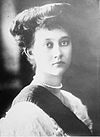Prime_Minister_of_Luxembourg
The prime minister of Luxembourg (Luxembourgish: Premierminister vu Lëtzebuerg; French: Premier ministre luxembourgeois; German: Premierminister von Luxemburg) is the head of government of Luxembourg. The prime minister leads the executive branch, chairs the Cabinet and appoints its ministers.
| Prime Minister of Luxembourg | |
|---|---|
| Luxembourgish: Premierminister vu Lëtzebuerg French: Premier ministre luxembourgeois German: Premierminister von Luxemburg | |
 | |
| Executive branch of the Grand Duchy of Luxembourg | |
| Style | Mr. Prime Minister (informal) The Honorable (formal) His Excellency (diplomatic) |
| Status | Head of government |
| Member of | |
| Reports to | Monarch • Parliament |
| Residence | Hôtel Saint-Maximin |
| Seat | Luxembourg City |
| Appointer | Grand Duke of Luxembourg |
| Term length | No fixed term |
| Constituting instrument | Constitution of the Grand Duchy of Luxembourg |
| Formation | 1 August 1848; 175 years ago (1848-08-01) |
| First holder | Gaspard-Théodore-Ignace de la Fontaine |
| Unofficial names | Minister of State "Premier" |
| Deputy | Deputy Prime Minister |
| Salary | €256,800 annually[1] |
| Website | gouvernement.lu |
Since 1989, the title of Prime Minister has been an official one,[2] although the head of the government had been unofficially known by that name for some time. Between 1857 and 1989, the prime minister was styled the President of the Government,[3] with the exception of the 25-day premiership of Mathias Mongenast.[4] Before 1857, the prime minister was the President of the Council. In addition to these titles, the prime minister uses the title Minister of State, although this is usually relegated to a secondary title.
This is a list of prime ministers and governments since the post was founded, in 1848. In larger font are the dates of the prime ministers entering and leaving office. The smaller dates, during the respective premierships, are those of the prime ministers' governments. Luxembourg has a collegial governmental system; often, the government will present its resignation, only for the successor government to include many, if not most, of the previous ministers serving under the same prime minister. Each of the smaller dates reflects a change in the government without a change of prime minister.
From the promulgation of the first constitution, in 1848, until the early twentieth century, Luxembourgish politics was dominated by independent politicians and statesmen.[5] The prerogative powers of the grand duke remained undiluted, and, as such, the monarch actively chose and personally appointed the prime minister. As a result, the prime minister was often a moderate, without any strong affiliation to either of the two major ideological factions in the Chamber of Deputies: the secularist liberals and the Catholic conservatives.
In the early twentieth century, the emergence of socialism as a third force in Luxembourgish politics ended the dominance of independents, and further politicised the government of the country.[5] This did not affect the prime minister's position until 1915, when the long-serving Paul Eyschen died in office. His death created a struggle for power between the main factions, leading to the establishment of the formalised party system.[6]
Prime ministers from 1848 to 1890
| Prime Minister (birth–death) |
Portrait | Term of office | Monarchs (Reign) | ||||
|---|---|---|---|---|---|---|---|
| No. | Start | End | |||||
| 1 | Gaspard-Théodore-Ignace de la Fontaine (1787–1871) |
 |
1 August 1848 | 6 December 1848 | Willem II  (1840–1849) | ||
| First Prime Minister. Resigned following a Vote of no confidence.[7] | |||||||
| 2 | Jean-Jacques Madeleine Willmar (1792–1866) |
 |
6 December 1848 | 23 September 1853 | Willem III  (1849–1890) | ||
| Dismissed by the Governor[8] | |||||||
| 3 | Charles-Mathias Simons (1802–1874) |
 |
1 2 3 4 5 6 7 8 |
23 September 1853 23 September 1854 24 May 1856 2 June 1857 29 November 1857 12 November 1858 23 June 1859 15 July 1859 |
23 September 1854 24 May 1856 2 June 1857 29 November 1857 12 November 1858 23 June 1859 15 July 1859 26 September 1860 | ||
| Coup of 1856. President of the Council until November 1857; thereafter President of the Government. Resigned.[9] | |||||||
| 4 | Victor, Baron de Tornaco (1805–1875) |
 |
1 2 3 4 5 6 7 |
26 September 1860 9 September 1863 31 March 1864 26 January 1866 3 December 1866 14 December 1866 18 June 1867 |
9 September 1863 31 March 1864 26 January 1866 3 December 1866 14 December 1866 18 June 1867 3 December 1867 | ||
| Shortest cabinet, December 1866. Luxembourg Crisis; Treaty of London. Resigned following a Vote of no confidence.[10] | |||||||
| 5 | Lambert Joseph Emmanuel Servais (1811–1890) |
 |
1 2 3 4 5 |
3 December 1867 30 September 1869 12 October 1869 7 February 1870 25 May 1873 |
30 September 1869 12 October 1869 7 February 1870 25 May 1873 26 December 1874 | ||
| Resigned.[11] | |||||||
| 6 | Félix, Baron de Blochausen (1834–1915) |
 |
1 2 3 4 5 6 |
26 December 1874 26 April 1875 8 July 1876 6 August 1878 21 September 1882 12 October 1882 |
26 April 1875 8 July 1876 6 August 1878 21 September 1882 12 October 1882 20 February 1885 | ||
| Dismissed by the Grand Duke.[12] | |||||||
| 7 | Jules Georges Édouard Thilges (1817–1904) |
 |
20 February 1885 | 22 September 1888 | |||
| Resigned.[13] | |||||||
The Kingdom of the Netherlands shared the same monarchs with the Grand Duchy of Luxembourg from 1815 to 1890. The Grand Duchy has had its own monarchs since 1890.
Prime ministers from 1890 to 1918
| Prime Minister (birth–death) |
Portrait | Term of office | Monarchs (Reign) | ||||
|---|---|---|---|---|---|---|---|
| No. | Start | End | |||||
| 8 | Paul Eyschen (1841–1915) |
 |
1 2 3 4 5 6 |
22 September 1888 26 October 1892 23 June 1896 25 October 1905 9 January 1910 3 March 1915 |
26 October 1892 23 June 1896 25 October 1905 9 January 1910 3 March 1915 11 October 1915 |
Adolphe  (1890–1905) Guillaume IV  (1905–1912) | |
| Longest premiership. Longest cabinet 1896–1905. Luxembourg occupied by Germany on 2 August 1914. Died in office.[6] | |||||||
| 9 | Mathias Mongenast (1843–1926) |
 |
12 October 1915 | 6 November 1915 | Marie-Adélaïde  (1912–1919) | ||
| Shortest premiership. Ruled as President of the Council. Resigned.[4] | |||||||
| 10 | Hubert Loutsch (1878–1946) |
 |
6 November 1915 | 24 February 1916 | |||
| Minority government.[14] Resigned following a Vote of no confidence.[14] | |||||||
| 11 | Victor Thorn (1844–1930) |
 |
24 February 1916 | 19 June 1917 | |||
| National Union Government. Resigned.[15] | |||||||
| 12 | Léon Kauffman (1869–1952) |
 |
19 June 1917 | 28 September 1918 | |||
| Resigned.[16] | |||||||

In 1918, towards the end of World War I, a new Chamber of Deputies was elected with the explicit ambition of reviewing the constitution.[16] To this end, formalised parties were formed by the main political blocs, so as to increase their bargaining power in the negotiations. The revisions to the constitution introduced universal suffrage and compulsory voting, adopted proportional representation, and limited the sovereignty of the monarch.
Since the foundation of the party system, only one cabinet (between 1921 and 1925) has not included members of more than one party. Most of the time, governments are grand coalitions of the two largest parties, no matter their ideology; this has made Luxembourg one of the most stable democracies in the world.[17] Two cabinets (between 1945 and 1947) included members of every party represented in the Chamber of Deputies.
During the occupation of Luxembourg by Nazi Germany in World War II, Luxembourg was governed by a Nazi Party official, Gustav Simon. Pierre Dupong continued to lead the government in exile in the United Kingdom until the liberation of Luxembourg in December 1944, whereupon the constitutional Luxembourg government returned to the Grand Duchy. Thus, although Luxembourg was formally annexed on 30 August 1942, the prime minister of the government in exile, Pierre Dupong, is assumed to have remained prime minister throughout.
Prime ministers since 1918
Political Party: PD PNI CSV DP
| # | Prime Minister (birth–death) |
Portrait | Political party | Term of office | Government | Coalition | Monarchs (Reign) | |||
|---|---|---|---|---|---|---|---|---|---|---|
| Election | Start | End | ||||||||
| 13 | Émile Reuter (1874–1973) |
 |
PD | — 1919 1922 |
28 September 1918 5 January 1920 15 April 1921 |
5 January 1920 15 April 1921 20 March 1925 |
Reuter | PD, LL PD, LL PD |
Marie-Adélaïde | |
| Charlotte (1919–1964) | ||||||||||
| First partisan government. Armistice; Constitution amended.[16] Only one-party cabinet 1921–1925. Resigned.[18] | ||||||||||
| 14 | Pierre Prüm (1886–1950) |
 |
PNI | 1925 | 20 March 1925 | 16 July 1926 | Prüm | PNI, PRS | ||
| Only PNI premiership. Resigned.[19] | ||||||||||
| 15 | Joseph Bech (1887–1975) (1st time) |
 |
PD | 1928, 31 1934 1937 |
16 July 1926 11 April 1932 27 December 1936 |
11 April 1932 27 December 1936 5 November 1937 |
Bech | PD, LdG PD, PRL PD, PRL | ||
| Longest party-era cabinet 1926–1932. Resigned.[20] | ||||||||||
| 16 | Pierre Dupong (1885–1953) |
 |
PD | — — — |
5 November 1937 7 February 1938 6 April 1940 |
7 February 1938 6 April 1940 10 May 1940 |
Dupong-Krier | PD, POL, PRL PD, POL PD, POL | ||
| — | 10 May 1940 | 23 November 1944 | Govt. in Exile | PD, POL | ||||||
| CSV | — — — |
23 November 1944 23 February 1945 21 April 1945 |
23 February 1945 21 April 1945 14 November 1945 |
Liberation | CSV, LSAP | |||||
| 1945 — |
14 November 1945 29 August 1946 |
29 August 1946 1 March 1947 |
National Union | CSV, LSAP, GD, KPL | ||||||
| — 1948 |
1 March 1947 14 July 1948 |
14 July 1948 3 July 1951 |
Dupong-Schaus | CSV, GD | ||||||
| 1951 | 3 July 1951 | 23 December 1953 | Dupong-Bodson | CSV, LSAP | ||||||
| World War II; Luxembourg remained neutral.[21] Emergency government; Nazi occupation; government in exile.
Liberation Governments;[22] neutrality ended.[23] National Union Governments.[24] Died in office.[25] | ||||||||||
| 17 | Joseph Bech (1887–1975) (2nd time) |
 |
CSV | — 1954 |
29 December 1953 29 June 1954 |
29 June 1954 29 March 1958 |
Bech-Bodson | CSV, LSAP | ||
| Resigned.[26] | ||||||||||
| 18 | Pierre Frieden (1892–1959) |
CSV | 1959 | 29 March 1958 | 23 February 1959 | Frieden | CSV, LSAP | |||
| Won 1959 election; died in office.[27] | ||||||||||
| 19 | Pierre Werner (1913–2002) (1st time) |
 |
CSV | — | 2 March 1959 | 15 July 1964 | Werner-Schaus I | CSV, DP | ||
| 1964 — |
15 July 1964 3 January 1967 |
3 January 1967 6 February 1969 |
Werner-Cravatte | CSV, LSAP | Jean (1964–2000) | |||||
| 1968 — — |
6 February 1969 5 July 1971 19 September 1972 |
5 July 1971 19 September 1972 15 June 1974 |
Werner-Schaus II | CSV, DP | ||||||
| Longest party-era premiership. Went into opposition following 1974 election.[28] | ||||||||||
| 20 | Gaston Egmond Thorn (1928–2007) |
 |
DP | 1974 — — |
15 June 1974 21 July 1976 16 September 1977 |
21 July 1976 16 September 1977 16 July 1979 |
Thorn | DP, LSAP | ||
| First DP premiership. Became Deputy Prime Minister under Werner when CSV returned to government following 1979 election.[29] | ||||||||||
| 21 | Pierre Werner (1913–2002) (2nd time) |
 |
CSV | 1979 — |
16 July 1979 3 March 1980 |
3 March 1980 22 November 1980 |
Werner-Thorn | CSV, DP | ||
| — — |
22 November 1980 21 December 1982 |
21 December 1982 20 July 1984 |
Werner-Flesch | |||||||
| Retired at 1984 election.[30] | ||||||||||
| 22 | Jacques Santer (born 1937) |
 |
CSV | 1984 | 20 July 1984 | 14 July 1989 | Santer-Poos I | CSV, LSAP | ||
| 1989 — |
14 July 1989 9 December 1992 |
9 December 1992 13 July 1994 |
Santer-Poos II | |||||||
| 1994 | 13 July 1994 | 26 January 1995 | Santer-Poos III | |||||||
| President of the Government until 1989; Prime Minister from 1989. Appointed EC President.[31] | ||||||||||
| 23 | Jean-Claude Juncker (born 1954) |
 |
CSV | — — |
26 January 1995 4 February 1998 |
4 February 1998 7 August 1999 |
Juncker-Poos | CSV, LSAP | ||
| 1999 | 7 August 1999 | 31 July 2004 | Juncker-Polfer | CSV, DP | Henri (2000–present) | |||||
| 2004 | 31 July 2004 | 23 July 2009 | Juncker-Asselborn I | CSV, LSAP | ||||||
| 2009 | 23 July 2009 | 4 December 2013 | Juncker-Asselborn II | |||||||
| Longest uninterrupted party-era premiership. Also President of the Eurogroup. Appointed EC President. | ||||||||||
| 24 | Xavier Bettel (born 1973) |
 |
DP | 2013 | 4 December 2013 | 5 December 2018 | Bettel I | DP, LSAP, DG | ||
| 2018 | 5 December 2018 | 17 November 2023 | Bettel II | |||||||
| 25 | Luc Frieden (born 1963) |
 |
CSV | 2023 | 17 November 2023 | Incumbent | Frieden-Bettel | CSV, DP | ||
- Specific
- "IG.com Pay Check". IG. Archived from the original on 25 April 2018. Retrieved 12 January 2020.
- Thewes (2003), p. 209
- Thewes (2003), p. 21
- Thewes (2003), p. 65
- Thewes (2003), p. 8
- Thewes (2003), p. 64
- Thewes (2003), p. 16
- Thewes (2003), p. 20
- Thewes (2003), p. 28
- Thewes (2003), p. 34
- Thewes (2003), p. 42
- Thewes (2003), p. 48
- Thewes (2003), p. 52
- Thewes (2003), p. 66
- Thewes (2003), p. 69
- Thewes (2003), p. 76
- Weston, Steve (2 March 2003). "Luxembourg Country Commercial Guide FY 2003: Political Environment". Retrieved 28 June 2006. [dead link]
- Thewes (2003), p. 88
- Thewes (2003), p. 90
- Thewes (2003), p. 104
- Thewes (2003), p. 107
- Thewes (2003), p. 115
- Thewes (2003), p. 118
- Thewes (2003), p. 122
- Thewes (2003), p. 140
- Thewes (2003), p. 148
- Thewes (2003), p. 151
- Thewes (2003), p. 182
- Thewes (2003), p. 192
- Thewes (2003), p. 204
- Thewes (2003), p. 222
- Bibliography
- Thewes, Guy (July 2003). Les gouvernements du Grand-Duché de Luxembourg depuis 1848 (PDF) (in French) (Édition limitée ed.). Luxembourg City: Service Information et Presse. ISBN 2-87999-118-8. Retrieved 23 July 2020.
- "Les gouvernements de 1848 à nos jours" (in French). Service Information et Presse. 31 July 2004. Archived from the original on 8 July 2006. Retrieved 2 August 2006.
